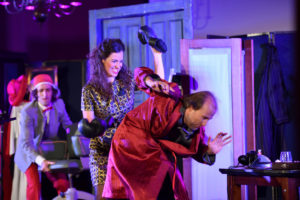
Banchetto Musicale 2019 Review: Pimpinone
18th-century opera in The Style Wes Anderson
By Polina Lyapustina(Credits: Vytautas Abramauskas)
“Thanks for coming to our audition,” a charismatic bellboy told visitors in the hall before the performance. With a quirky smile, he handed everyone an old school ticket with a number on it. “We are looking for musicians, singers, and servants.”
That’s how an operatic performance of Telemann’s “Pimpinone” began last Sunday during this year’s Banchetto Musicale Festival at the Palace of Grand Dukes of Lithuania.
Once everyone took their places, the bellboy started to call different numbers, and soon we had the whole orchestra set to play, a cook sent to the kitchen, and a beautiful girl on a stage ready to win her dream position.
Telemann’s Rare Work
“Pimpinone” is a comic opera in three parts by the German composer Georg Philipp Telemann with a libretto in both Italian and German by Johann Philipp Praetorius. The mix of languages created a special atmosphere — at the beginning, it showed the social inequality between Pimpinone and Vespetta. Later, the lingual merger pointed out when social and personal borders collapsed.
The full title of this work is “The Unequal Marriage Between Vespetta and Pimpinone or The Domineering Chambermaid.” Vespetta, the chambermaid, wheedles her way into marrying her employer, old Pimpinone. Once married she shows her bad-tempered nature (the name Vespetta means “little wasp”) and ultimately rules her husband, who tries at first to reason a lovely troublemaker, then to resist her perception of marriage, but eventually loses and resigns to his fate.
Pure Gems
German soprano Julia Kirchner interpreted a smart manipulator, both adorable and obviously greedy. Her fast and high recitatives were clean and legible. She shone with sweet and light Baroque singing, her sound a suitable match for the Great Renaissance Hall. Although this opera is quite short, it allowed us to see a wide array of the soprano’s colors, including gleaming high notes in lovely lyrical passages during Intermezzo I to the deeper sound of a great volume in Intermezzo III. Both high and bottom sounds produced vibrato of the highest quality.
Bass-baritone Carsten Krüger was a pure gem as a singer and an actor. He was experienced and prudent (in his own ridiculous way) at the beginning – self-protecting, then enamored and fascinated, and eventually, furious and desperate. And everything he’d done in this absurd story somehow looked believable.
Vocally he was the first class too. Although his interpretation was Early Classical rather than Baroque in its style, his voice was rich, with numerous shades, bringing some dramatic values to his comic character. His aria (or rather duet with himself) “So quel che si dice e quel che si fa” was a special treat. With the support of his faithful bellboy, he turned this endlessly repeating scene into a well developed emotional story.
Dealing with repeating phrases is an important skill for Baroque music singers, and fortunately, both singers that night have mastered it perfectly.
Masters
One of the greatest features of Banchetto Musicale is the international ensemble led by musical director Alina Rotaru. A great achievement seems to me the integration of Baroque music in a modern staging without making it sound artificial and alien. This year, the ensemble treated the audience with a vivid and natural sound, which could in the right time stand out or retreat, supporting the vocal part.
Baroque music obviously has its signature sounds and could be hardly confused with something else. And yet, the art of that time covered many topics, some of which are still relevant if not eternal. And to work with those topics to the accompaniment of old music could be challenging and exciting at the same time.
Spanish performer Claudio Levati was set to direct and play an important role in this performance. His idea of transforming a villa of an old bachelor into a hotel with a discerning and enterprising bellboy proved extremely successful. His character embodied the voice of reason in this play. His observations on the young maid were highly critical from the very beginning, and yet his master never paid attention to it.
Perhaps, this character significantly expanded the narrative, adding more sense behind the story based on the popular sexist clichés of that, and to some extent our, time. Besides the maid’s actions, we saw the man giving up logic and reason for promises of enjoyment. Being warned, he’s not a helpless victim – he made his choice. And this very voice of reason would stay with Pimpinone to settle down his presence after the young wife left him alone.
Women were chosen as the main theme for this year festival, filled with the great music of the past written by female composers, as well as some pieces dedicated to women. Though the tale of Pimpinone and his marriage doesn’t represent women in the best way, this eternal story is very sapient and when told in such a curious and talented way, it is definitely worth being retold as often as possible.



